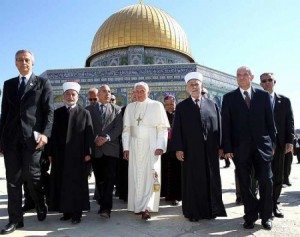 There is a future for Israel. The OT points to a Messianic kingdom (Isaiah 9:6-7, Mic. 4:1; Isa. 2:2-3, 11:6-9) and temple on Mount Zion (Ezek. 40:48; Isa. 2:2; Hag. 2:7-9; Zech. 6:12-13; Joel 3:18). God made unconditional promises in the Abrahamic covenant (Gen. 13:14-17) that have never been fulfilled at any time in history. Even though Israel violated the Mosaic Covenant, Paul makes clear that it did not make void the Abrahamic (Gal 3:17). In a similar fashion, the Davidic covenant (2 Sam 7:11-16; cf. 1 Chron. 17) expanded God’s blessings to Israel and was irrevocable, stating that “your throne will be established forever.” The New Covenant states explicitly that God will make it with “the house of Israel” (Jer. 31:31-33).
There is a future for Israel. The OT points to a Messianic kingdom (Isaiah 9:6-7, Mic. 4:1; Isa. 2:2-3, 11:6-9) and temple on Mount Zion (Ezek. 40:48; Isa. 2:2; Hag. 2:7-9; Zech. 6:12-13; Joel 3:18). God made unconditional promises in the Abrahamic covenant (Gen. 13:14-17) that have never been fulfilled at any time in history. Even though Israel violated the Mosaic Covenant, Paul makes clear that it did not make void the Abrahamic (Gal 3:17). In a similar fashion, the Davidic covenant (2 Sam 7:11-16; cf. 1 Chron. 17) expanded God’s blessings to Israel and was irrevocable, stating that “your throne will be established forever.” The New Covenant states explicitly that God will make it with “the house of Israel” (Jer. 31:31-33).
In Acts 1:6 just before the ascension the disciples ask Jesus, “Lord, will you at this time restore the kingdom to Israel?” Did Jesus say, “Sorry, Israel forfeited?” No, instead he says “It is not for you to know times or seasons…” This infers a future time when God will restore the Kingdom to Israel. In Luke 22:30, Jesus makes clear that national Israel will not only be present in the future kingdom but that they will still retain tribal identity. Also, the 144,000 are chosen from the 12 tribes (Rev. 7:4). The church does not have tribes. If the church has replaced national Israel as “spiritual Israel” this is incoherent. In Romans 9-11, Paul’s purpose was to explain Israel’s future. The gentile church is clearly described as “grafted into” not replacing Israel. God could not have been any clearer than their election being “irrevocable” (Rom. 11:28-29). Robert Saucy argues that their restoration is a part of God’s continuing revelation to the world.
It would seem reasonable in the light of the prophetic Scriptures that we have noted concerning God’s revelation of himself to the nations through the judgment and restoration of Israel to believe that he has not completed that revelation through the realities of history and that he yet intends to display his redemptive power overtly in the restoration of his people as a people. [i]
In Isaiah 19:16-24 we read that Egypt will be attacked in the Day of the Lord and the result will be that Egypt will repent and convert to the worship of Yahweh. This is yet to occur. Clearly, Israel has a future in the spiritual leadership of the world (Zech. 8:23; cf. Zech. 14).
Israel’s literal national restoration is not captured any more explicitly than in Amos 9:11-15. Verses 11-12 speak of the political revival under the Davidic Messiah (cf. Ezek. 34). This is the fulfillment of the Davidic covenant and of the angel Gabriel’s promise to Mary that Jesus would sit on David’s throne – forever – which did not even exist during the first advent (Lk. 1:32-33). Verses 13-15 turn to the restoration of the fertility of the land and the return of the people. While this passage was a message of hope for the exiles, it is necessarily a case of the “already but not yet” paradigm at work in prophecy. God states categorically that they will return to “never again be uprooted” (v.15). While they were uprooted again in A.D. 70 by the Romans, Isaiah foretold:
In that day the Lord will reach out his hand a second time to reclaim the remnant that is left of his people from Assyria, from Lower Egypt, from Upper Egypt, from Cush, from Elam, from Babylonia, from Hamath and from the islands of the sea. (Isa. 11:11)
We live in a time of active prophetic fulfillment because this began in 1948, when national Israel was reestablished and Jews returned from far and wide to the land. This is ongoing and is reflected in the present day turmoil in the Middle East over Jerusalem (Zech. 12:2-3).
Israel’s glorious future is not captured any more beautifully than in Isaiah. This is revealed in poetry like “Arise, shine, for your light has come, and the glory of the Lord has risen upon you” (Is 60:1) and underneath the text within its form. A chiasm is a literary device in which a pattern such as A-B-C-B´-A´ is employed to give special weight to the middle ‘C’ portion. Chapters 60-62 are given prominence as the center of a chiasm made up of chapters 56–66.[ii] This is an example of the “already but not yet” paradigm as well. The church is the figurative “already” part of the kingdom, but the messianic age awaits literal fulfillment. Although much still anticipates future fulfillment, God’s light has reached the world through the gospel and many nations have come to Jerusalem in response. Jesus’ message has gone out to the world as the church evangelizes the nations. Still yet, verses 60:19-22 clearly forecast the Edenic New Jerusalem in Revelation 21:23:
“The sun shall be no more your light by day,
nor for brightness shall the moon give you light;
but the Lord will be your everlasting light,
and your God will be your glory.
Your sun shall no more go down,
nor your moon withdraw itself;
for the Lord will be your everlasting light,
and your days of mourning shall be ended.
Your people shall all be righteous;
they shall possess the land forever,
the branch of my planting,
the work of my hands,
that I might be glorified.
The least one shall become a clan,
and the smallest one a mighty nation;
I am the Lord; in its time I will hasten it.”
(Is 60:19-22)
Maranatha!
[i] Robert L. Saucy. “A Rationale for the Future of Israel.” Journal of the Evangelical Theological Society, December 1985: 438.
[ii]John Oswalt, The NIV Application Commentary: Isaiah (Grand Rapids, MI: Zondervan Publishing House, 2003), 641.




